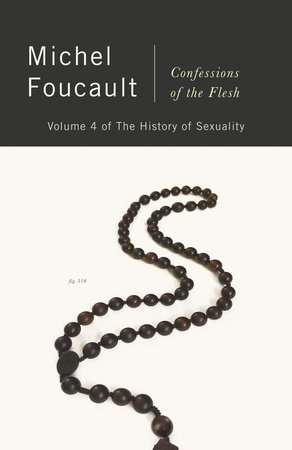By Caitlin Landuyt, Editor, Knopf Doubleday Publishing Group
I am being haunted by the ghost of Michel Foucault. Each time I think I’ve read or studied him for the last time, something conspires to bring him back into my life. My last foray into his philosophy was in grad school, where I was getting a masters in African studies. My professor assigned Foucault—his History of Sexuality Vol. 1, in fact—to compare Foucault’s thoughts on the colonization of the body to actual colonization. Some of us felt that we could have skipped the elaborate metaphor, but my professor believed very strongly that Foucault could teach us more on the matter than anyone else. He’s not alone. Foucault is the kind of writer who inspires strong feelings. When I shared with friends and colleagues the fact that I was working on a previously unpublished book by Foucault—Confessions of the Flesh, the fourth volume in his History of Sexuality—I got the following reactions: “Oh you’re so lucky. I LOVE Foucault!” “Oh god, not more Foucault! What’s he saying now?” and “You know, the more we talk about this the more I realize it’s not actually that I like Foucault so much as that I like the intellectual heft of saying I like Foucault.” Even those who hate Foucault want to engage with him.
And, indeed, teachers and students have flocked to Foucault’s work for years. The first three volumes of the History of Sexuality, originally published by Pantheon in the 70s and 80s have been bestsellers in the academic world. Confessions of the Flesh caused a global sensation when it was first published by Gallimard in February 2018, with even English-language newspapers like The New York Times and The Guardian covering the event.
The work—which was unfinished at the time of Foucault’s death—completes Foucault’s History of Sexuality series, his exploration of how power shapes culture and moral notions of sexuality. In this fourth volume he posits that repressive views on sexuality, and self-policing of our own sexuality, originate in the sacrament of confession. As is typical of his work, Foucault’s critique is both rigorously grounded in relevant literature and intensely personal. This volume reflects Foucault’s struggle with his own Catholic upbringing as well as engaging critically with influential Christian philosophers.
Access to Confessions of the Flesh was initially restricted to academics per Foucault’s wish that none of his unfinished work should be published posthumously. But Foucault’s nephew believed everyone should be able to read the text, a mentality shared by Foucault’s longtime partner, Daniel Defert, who famously said “it is either everybody or nobody.” Finally, everybody has access to the entirety of Foucault’s History of Sexuality, and I’m so thrilled to have been a part of the team that brought it to the English-speaking world.






